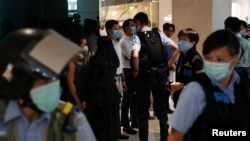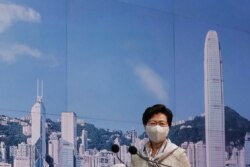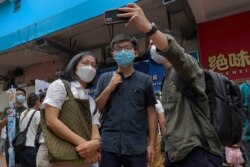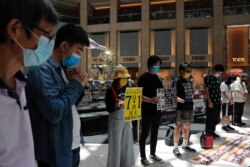China’s legislature has passed a controversial national security law for Hong Kong that is causing widespread jitters among activists and ordinary citizens.
Passage of the law has prompted several activist groups to immediately close while individuals delete social media posts out of fear that the new measures could send them to jail.
The official Xinhua news agency reported that China’s top lawmaking body, the standing committee of the National People’s Congress, adopted the measure on Tuesday and President Xi Jinping signed an order to endorse it. Xinhua said the new measure will be added to a list of national laws that apply to Hong Kong in an annex of its mini constitution, the Basic Law.
The law was enacted late Tuesday night at 11 p.m. local time after it was gazetted by the Hong Kong government, and the full text of the law was finally revealed nearly 14 hours after the law passed in Beijing Tuesday early morning.
Xinhua quoted Li Zhanshu, chairman of the NPC Standing Committee, as saying the legislation has adopted the principle of “punishing a minority while protecting the majority.” He said the move will safeguard the country’s security and Hong Kong’s “long-term stability.”
U.S. Secretary of State Mike Pompeo said in a statement Tuesday that said, “The United States will continue to stand with the freedom-loving people of Hong Kong and respond to Beijing’s attacks on freedoms of speech, the press, and assembly, as well as the rule of law, all of which have, until now, allowed the territory to flourish.
“Today marks a sad day for Hong Kong, and for freedom-loving people across China,” the statement said.
On Monday, ahead of the law’s likely passage, Pompeo released a statement that said: “The Chinese Communist Party’s decision to eviscerate Hong Kong’s freedoms has forced the Trump Administration to re-evaluate its policies toward the territory.”
Aimed at stopping the often-violent protests in the anti-government movement that roiled Hong Kong over the past year, the legislation criminalizes secession, subversion, terrorism and collusion with foreign forces.
The law states that anyone who organizes or participates in activities that aims at “splitting the country” and “undermining the unification of the country,” through force or not, would be considered guilty of secession. It also states that anyone who organizes or participates in activities aimed at subverting state power through the use of force “or other illegal means” would be guilty of “subversion of state power.”
For these categories, if convicted the “principle” or “serious” offenders will be given life imprisonment or imprisonment of 10 years or more. Active participants would be sentenced to three to 10 years in jail and ordinary participants would be given three years or less in jail or detention. People who incite, assist, abet or fund the people guilty of secession and subversion would be guilty also: serious offenders will get five to 10 years in jail and less-serious offenders will get five years or less in jail or detention.
For the category of terrorism, the law says anyone who coerce the central Chinese government, Hong Kong government and intimidate the public to “materialize political advocacy,” organize or participate in a range of acts that involves violence, explosions or arsons aimed at creating terrorism would be guilty. People convicted in “serious” cases will be given between five to 10 years in jail and have their properties confiscated.
The law also says anyone who steals, spies, buys, or provides state secrets or intelligence concerning national security for a foreign country shall be guilty of an offence. Those who seek help from or conspires with a foreign country or receive instructions or funding or “other kinds of” support from a foreign country would be guilty of “collusion“ with foreign forces.
If convicted, a “serious offender” would be imprisoned for 10 years or more or given life imprisonment.
Local media reports quote sources as saying that Hong Kong’s top leader and the Beijing-led national security agency in Hong Kong could send "serious" national security cases to mainland Chinese courts to be tried under "special circumstances.''
Local reports also say while the law is not supposed to be applied retroactively, acts from the past two years that have “endangered the state” could be used as evidence in courts, they say.
Eric Cheung, law professor at the University of Hong Kong, said the law was worse than he had expected. He said the language of the law adopted mainland Chinese legal concepts, which are starkly different from the concepts in Hong Kong's common law system
He was also concerned that the law has not defined national security and would adopt the broad definitions of national security in mainland China’s national security law, adopted in 2015.
China can also exercise jurisdiction on national security cases in Hong Kong that involve “complex situations of foreign interference by extraterritorial forces” difficult for the Hong Kong government to handle, “serious circumstances” where the Hong Kong government cannot enforce the law and situations where China faces “grave” threats.
Just hours after passage of the bill, high-profile young political activists, including Joshua Wong, Nathan Law and Agnes Chow, announced they would quit their group, Demosisto, and the group itself also announced it would fold. Two pro-independence groups, Hong Kong National Front and Studentlocalism, also said they would close.
Wong, 23, said on his Facebook page that for democracy activists, it is “no longer a joke to fear for one’s life,” adding that they also face jail terms, interrogations in special detention centers and being sent to China for trials. China’s state media have repeatedly accused Wong as well as other prominent pro-democracy figures such as Jimmy Lai and Martin Lee of “collusion with foreign powers” for their engagements with U.S. and other foreign governments. Collusion will be one of the four national security crimes under the new law.
“No one is sure about what will happen tomorrow,” he said, vowing to continue fighting for his belief in his personal capacity. “[But] the will of Hong Kong won’t be crushed by a national security law or any other bad laws.”
Ordinary Hong Kongers say they are also anxious about the loss of basic freedoms and the rule of law.
“I’d be scared whatever way they use the law. You don’t know when you’d step on the red line,” a university student who identified himself as Michael said. “From now on, we have to learn how to survive under a dictatorship.”
Michael said he and many of his friends have been deleting social media posts in case they are implicated under the new law.
The national security law also overrides Hong Kong legislation “should conflicts arise,” while the power of interpreting the new measure is vested in the National People's Congress Standing Committee.
Hong Kong’s top leader, Carrie Lam, said in a statement that the city’s government will establish a commission for safeguarding national security and that it will be chaired by her. Dedicated units in the Hong Kong police force and the department of justice will be responsible for implementing the relevant legal provisions in the law, the statement added.
China will also establish an agency to analyze the national security situation in Hong Kong and “monitor, supervise, coordinate and support” the local government’s efforts, collect intelligence and handle relevant cases.
“After the implementation of the National Security Law, the social unrest which has troubled Hong Kong people for nearly a year, will be eased and stability will be restored, thereby enabling Hong Kong to start anew," Lam said.
But political scientists disagree. They say using a draconian law to coerce superficial stability would only fuel resentment among citizens and is not a long-term solution.
“In the eyes of many Hong Kongers, this is the end of one country, two systems and Hong Kong will be just like any Chinese city and people have to behave likewise,” said Joseph Cheng, retired political scientist at the City University of Hong Kong.
“Beijing has achieved crushing the opposition in Hong Kong, but the price to pay is very high,” he said. “The international community is now reassessing the nature of the Communist regime and is more reluctant to engage with it.”
U.S. National Security Council spokesman John Ullyot said Tuesday, "Beijing’s passage of the National Security Law is a violation of its commitments under the Sino-British Joint Declaration.
“As Beijing now treats Hong Kong as ‘One Country, One System,’ so must the United States. The United States will continue to take strong actions against those who smothered Hong Kong’s freedom and autonomy. We urge Beijing to immediately reverse course,” he said.
The Trump administration took a series of steps after China announced its intention to approve the national security law back in May.
U.S. Secretary of State Mike Pompeo announced earlier in June that the United States no longer considers Hong Kong autonomous from China, and on Monday ended exports of defense equipment and dual-use technologies that originate in the U.S. to Hong Kong, citing national security purposes.
















